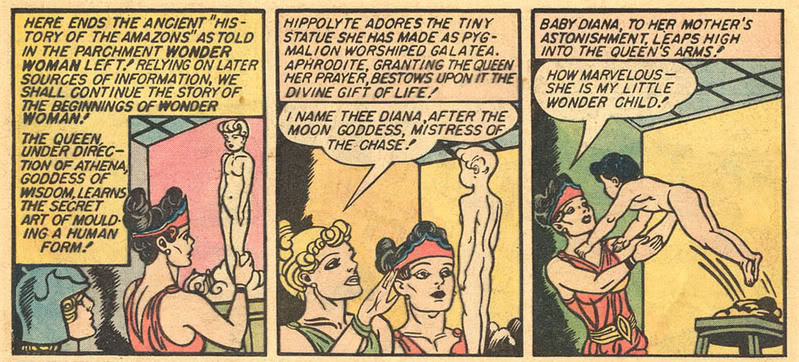Alyssa Rosenberg had a post yesterday about the Azzarello/Chiang Wonder Woman reboot. For those not in the know, the new (new!) WW is no longer a clay statue come to life; instead she’s the illegitimate daughter of Zeus. Alyssa expressed some skepticism:
Similarly, in their quest for specificity, I wonder if Azzarello and Chiang are reducing Wonder Woman a bit. Her original story may not be plausible, or gritty, but it is about an expression of female will and independence. Not everything needs to be grounded in social realism. Some things can just be mysterious and strange. It’s yet another reason we’re far too consumed with origin stories. Trying to come up with a psychologically plausible explanation for the divine, or near-so, is a bit of a contradiction in terms.
Several commenters though were more positive about the Azzarello/Chiang version. Joe Pettinati, for example, said:
I think this origin story sounds way better and I disagree with your assertion about trying to come up with a psychological explanation for the divine. All Greek myths, including Zeus, are about putting human faces to divine phenomena in our world. Even Wonder Woman’s original origin story (which I confess I’ve never heard) speaks about the human desire for children, presumably when natural methods are not an option. The problem I have with that origin story is that it says a lot more about Aphrodite and Hippolyta then it does about Wonder Woman. Okay, this woman is brought to life, but why does she become a super hero?
Of course, I’m in Marston/Peter’s corner:
The original Marston/Peter Wonder Woman origin story is beautiful and weird and kind of makes me tear up. I compared it to the Winter’s Tale in that link, and I’ll stand by that. And I think your argument about a psychological explanation for the divine is right on the money; Marston and Peter had a divine that was actually mysterious and powerful, not just a bunch of ultra superhumans running around bashing each other.
I haven’t read the Azzarello/Chiang issues. They’re both competent creators, and I suspect they can tell a decent pulp adventure story. But the Marston/Peter WW was one of the great artistic achievements of comics, IMO. And it was ideologically committed to feminism — in the case of the origin story, specifically to the idea of the power of female creation and mother/daughter bonds — in a way that is very, very rare, in comics or in other art forms or anywhere.
Oh…and to Joe, who asks why WW becomes a superhero. She becomes a superhero basically because she’s strong and curious and courageous and wants to help people. Marston didn’t feel that you needed a tragic or sordid backstory to make you a hero. He thought strength comes out of being loved and happy, not out of being wounded. More power to him.
I just wanted to add…the Azzarello/Chiang version is of course an improvement…if you’re demographic is mostly adult men. If that’s the case, the illegitimate-daughter-of-Zeus is clearly superior; it’s got sex, conflict, and the possibility of lots of gratuitous angsting. On the other hand, if your audience is 8-10 year old girls and boys, an origin all about who slept with whom and strained family dynamics is probably going to have less appeal. Instead, you probably want something with room for magic and courage and adventure and love and giant kangaroos.
Myself, I am old, old, and in my second childhood, so I’m all for the magic and love and giant kangaroos…though angsting and sex and strained family dynamics can be okay too, in their place. Why exactly you would want talented creators like Azzarello and Chiang to take the magic and love and kangaroos of the 8 year olds and turn them into the sex and angst and family dynamics for the thirty year olds is, of course, an open question. I’ve discussed some answers elsewhere, and won’t repeat it here except to note that Marston/Peter’s Wonder Woman was by far the most popular iteration of the character, and to express my doubts that Azzarello/Chiang’s version will change that, whatever it’s other successes.
Update: The argument in the last part of this post is shredded, torn apart, and stomped upon by commenters. The Percy Jackson series and the Prydain chronicles are cited as painfully telling counter-examples.

